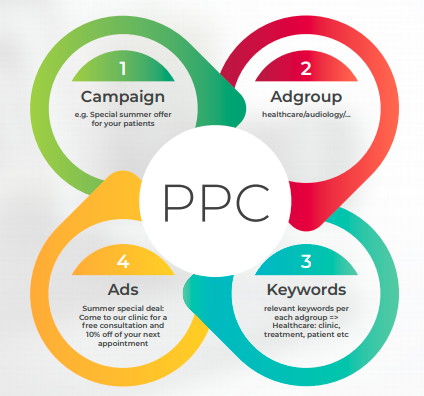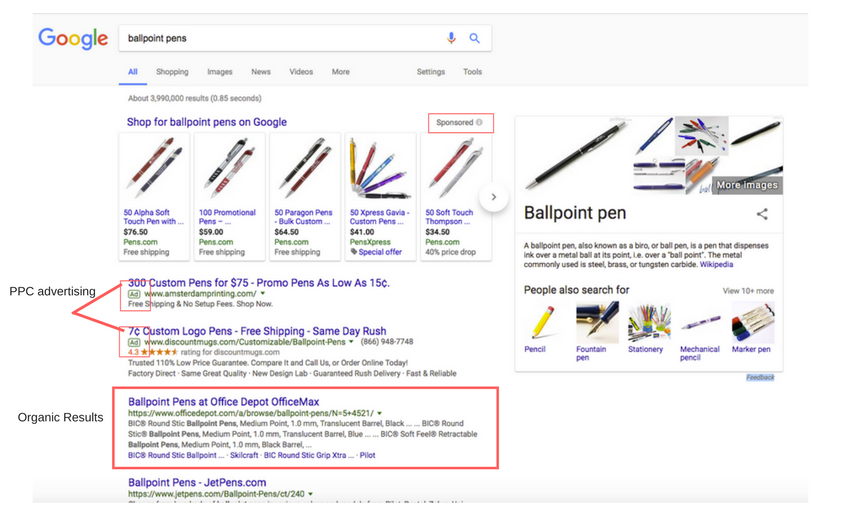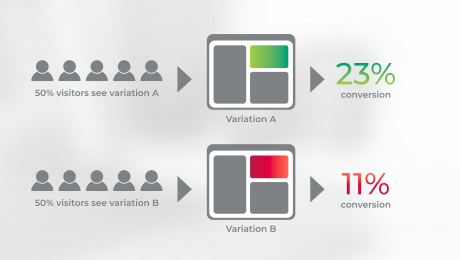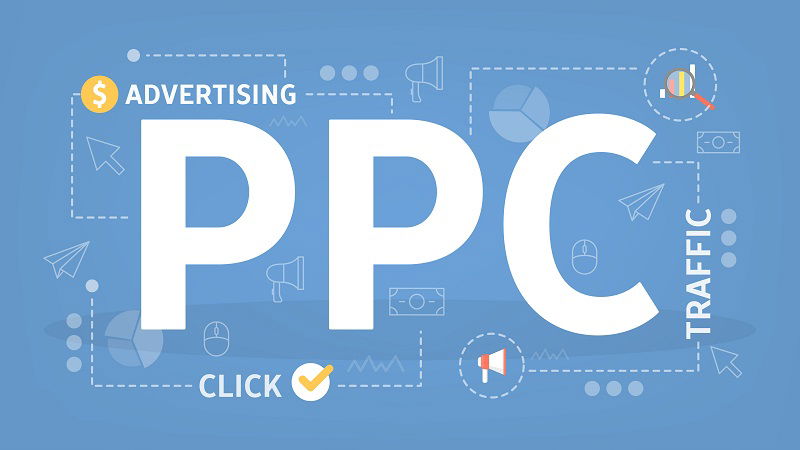PPC Ads 101 – The Basics
Have you been wondering how to reach your target audience more effectively? If you need results quickly, pay per click advertising (referred to as PPC from here on out) offers an alternative method to traditional forms of advertising that helps you attract new patients that are qualified to have an interest in your services.
In this PPC 101 guide, we have provided a rundown on everything PPC including:
- What is PPC?
- How does PPC work?
- What are the benefits of PPC?
- Who should use PPC?
- How can I get started with PPC?
What is PPC?
PPC (pay-per-click) marketing is a form of online advertising in which advertisers accrue costs when users click their ads. Advertisers bid on the perceived value of a click in relation to the keywords, platforms, and audience type in which it originates.
PPC advertising is known by a number of different names: paid search marketing, sponsored advertising, cost per click advertising, remarketing, or search engine marketing. Generally, PPC advertising is a digital marketing tactic in which you advertise within a search engine’s sponsored results by bidding for the keywords connected to your product.
As its name suggests, you pay each time your ad is clicked. Google AdWords is the most popular ad network when it comes to PPC, but there are also other alternatives you can consider that may offer cheaper, and sometimes more effective, options.

How Does PPC Work?
When you type a search query into Google, the search engines provide two sets of results: organic results and sponsored results. As seen here, the first few results on the left are sponsored results (indicated by the small green square around the word “Ad,” and the “Sponsored” label). All other page results are organic results or results that have not been paid for.

Most likely, the organic results made their way to the first page by executing an SEO strategy. On the other hand, the sponsored results made it to the first page by bidding the highest amount on the search terms, which in this case is “ballpoint pens.”
When a visitor clicks on one of the sponsored posts, the advertiser is charged for that click, hence pay per click advertising. The price of a “click” varies depending on the keyword – the popularity of the keyword, specificity of the keyword (long-tail vs. short-tail), and how many other advertisers are bidding on the same keyword as you.
You can use Google’s Traffic Estimator to receive traffic estimates for possible keywords. It will provide metrics like average cost per click, average position, click through rates, clicks per day, impressions per day, and total cost that will help you to determine if a keyword is a right fit for your campaign.
What Are The Benefits of PPC?
1. Reach the Right Audience
The specificity of keywords in PPC ads allows you to reach the right audience by choosing keywords that your target audience is searching for. Google aims to provide searchers with the most relevant results to their search, so if they are seeing your ad, it is highly likely that they were specifically looking for your product or service.
Not to mention, you can use geo-targeting to limit who can see your ads based on locations. For example, if you are a car mechanic in Colorado, it would be ill-advised to allow searchers in Maine to see your ads.
They are too far away to use your services, so it would be a waste of budget to allow them to see/click your ads. Ad group scheduling also enables you to choose specific days and times of the day so that you connect with your target audience during your prime business hours or when they are most active online.
2. Budget Control
PPC ads offer you budget control because you set your desired ad spend at the beginning of the advertising process before bidding begins. Unless you go back into the program and change it, this will remain a fixed amount. If your budget runs low, you simply quit paying for the ads and they will be removed from Google’s results page. Furthermore, you only pay when someone clicks on your ad, which means you’re only investing in people who are interested in your product or service.

3. Testing
Especially when a campaign is the first beginning, PPC ads are an excellent way to test how well your design, copy, or even your call-to-action buttons resonate with your target audience.
Using A/B testing, you can split test your ads and landing pages to see what elements (color, copy, layout) receive the best results (clicks, conversions, etc). You can then use this information to optimize all future ads to ensure you are getting the most bang for your buck with your marketing efforts.

4. Tracking
Proving ROI is a major part of being a marketer today. Luckily, PPC ads allow you to track every aspect of your ad campaign to connect your efforts to your results. You can see how each ad or keyword played a role in the success of your campaign, and all of this can be tied back to each penny spent on the campaign.
If you want to prove your worth, PPC campaigns will provide the reporting you need to demonstrate the value your campaign brings to your company.
Who Should Use PPC?
More than six billion online searches are made per day, 77 percent of which are conducted using Google. With that in mind, we believe that companies across most industries can benefit from implementing a PPC campaign.
The key to success is to plan ahead to minimize your ad spend and maximize your results. It’s important to consider what specific keywords your audience uses, as well as what type of ad will produce the best results for your product or service. As long as you make well-informed decisions from the start, a PPC campaign should help you increase awareness of and traffic to your site.
However, there are some specific industries that have fared especially well with PPC advertising because of the nature of their industry or products. Below is a list of some of the specific types of companies that have experienced great success with PPC campaigns.
Companies With Long Customer Lifetimes
Because PPC ads require constant investment, it’s the best situation when you are able to retain your customers for a long period of time after acquisition. For example, companies with recurring services, like telecom, financial services, utilities, and healthcare, often retain their customers for a long period of time. Customers in these sectors are highly valuable because they will provide predictable revenue over a long period of time. Knowing this, the initial ad spends used to attract these customers is worth the long-term payoff.
Companies With High Profit Margins
Companies with high-profit margins make a lot of money off one sale, meaning it doesn’t take long to see the return on their investment to acquire new customers. Examples of companies within this sector include lawyers, airlines, automotive companies, and home appliances.
Like companies with high customer lifetime value (the example above), the value of these customers comes from their low acquisition cost; they will likely spend a lot on their initial purchase, making it worth the initial investment in PPC ads.
Companies That Sell Uncommon Products
Have you ever had to shop for an odd product, like a replacement for a soap pump or a replacement clasp for a necklace, and wondered which stores would even carry it? We bet you went to the internet first to research where to find the product before you embarked on a wild goose chase to all the physical stores in a 20-mile radius with the hopes of finding it.
Companies who sell these odds-and-ends products benefit from using PPC ads because people who intend to purchase them use the internet to identify where they can find them. PPC ads allow these companies to swoop in during their customers’ moment of need and provide a solution with the click of a button.
Local Companies
Research shows that searches with local intent are more likely to lead to store visits and sales within a day, with 18 percent of local searches leading to sales compared to seven percent of non-local searches. To go back to our previous example, if you were to search “car repair,” you may be looking for quick car repair tips you can do yourself, but if you search “hearing aids Denver” it’s likely you are searching for a hearing health provider in your area to patronize.
This assumption can stretch across multiple searches. If a location is added to the search query, it’s probably the searcher is looking to visit the company in the near future.
Local SEO can be a highly competitive area. It’s wise for local businesses to invest in PPC advertising to ensure their company makes it to the top of the local recommendations and captures the searcher with purchasing intent.
As you can see in the image below, if you search for “hearing aids Denver,” the top four results are sponsored ads, which means those practices had the highest bid on the keyword. In return, it’s likely that the searcher will choose one of them to support their hearing health needs.

PPC With Audiology Plus
Audiology Plus can create an effective pay-per-click program that equips your business with revenue-generating advertising online. With a Fortune 500 talented team of professionals managing your program, you can:
- Place your business on the top of Google searches
- Follow your website’s visitors with targeted ads
- Stay on top of your customer’s minds
- Turn potential patients into real patients
Executing an effective PPC campaign can be a lot for one person to take on. Audiology Plus’s PPC program is a simple, straightforward and cost-effective solution and leverages our team of experts to work on your behalf to make sure your PPC strategy goes off without a hitch. Contact us today to learn more.




